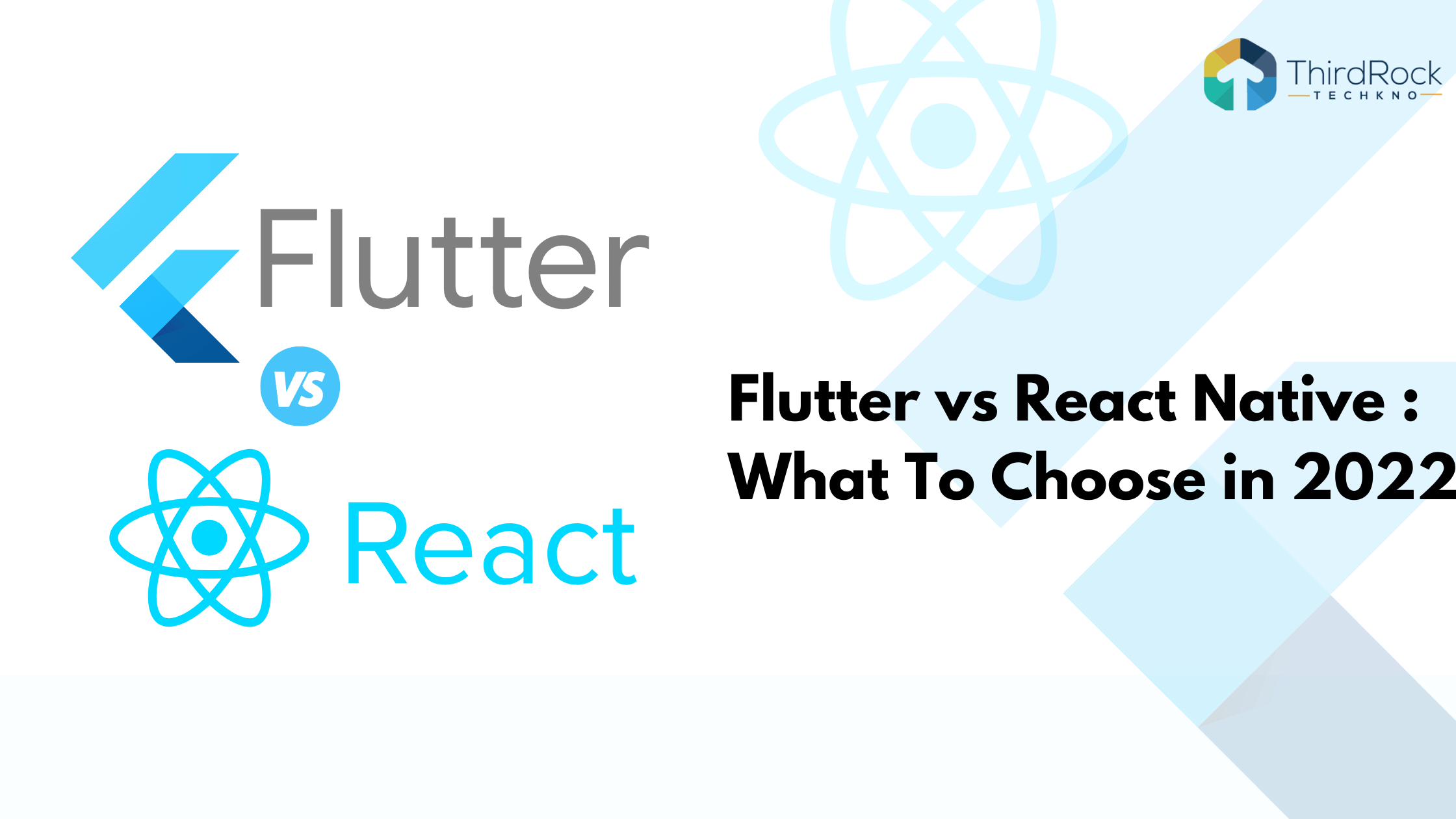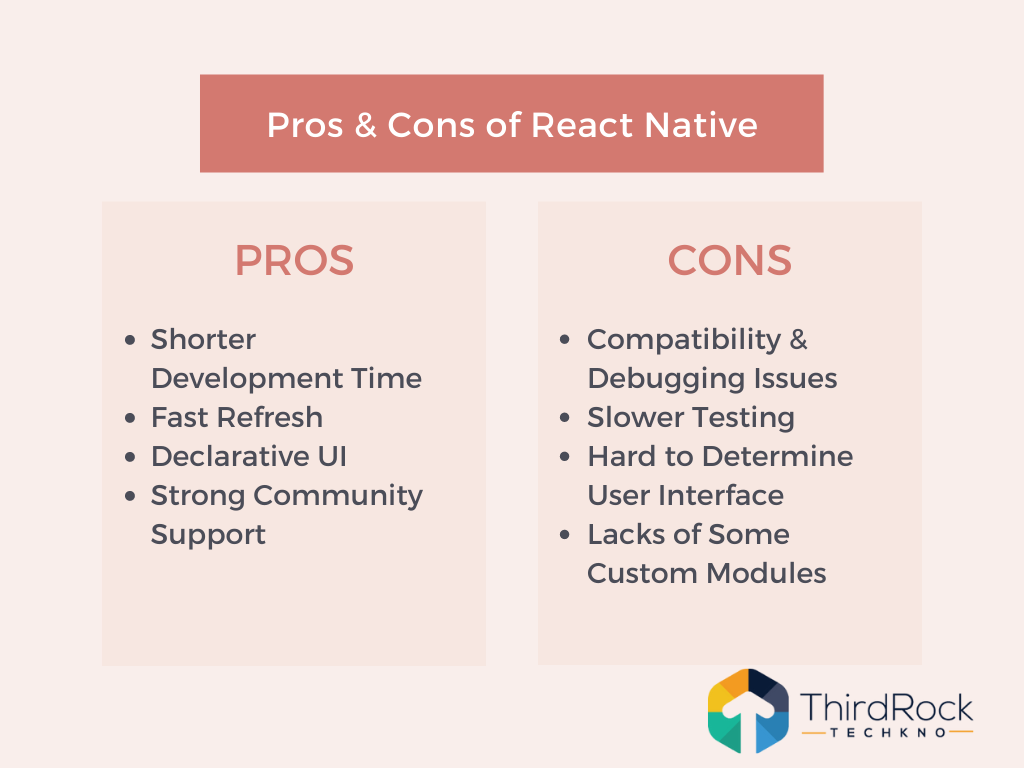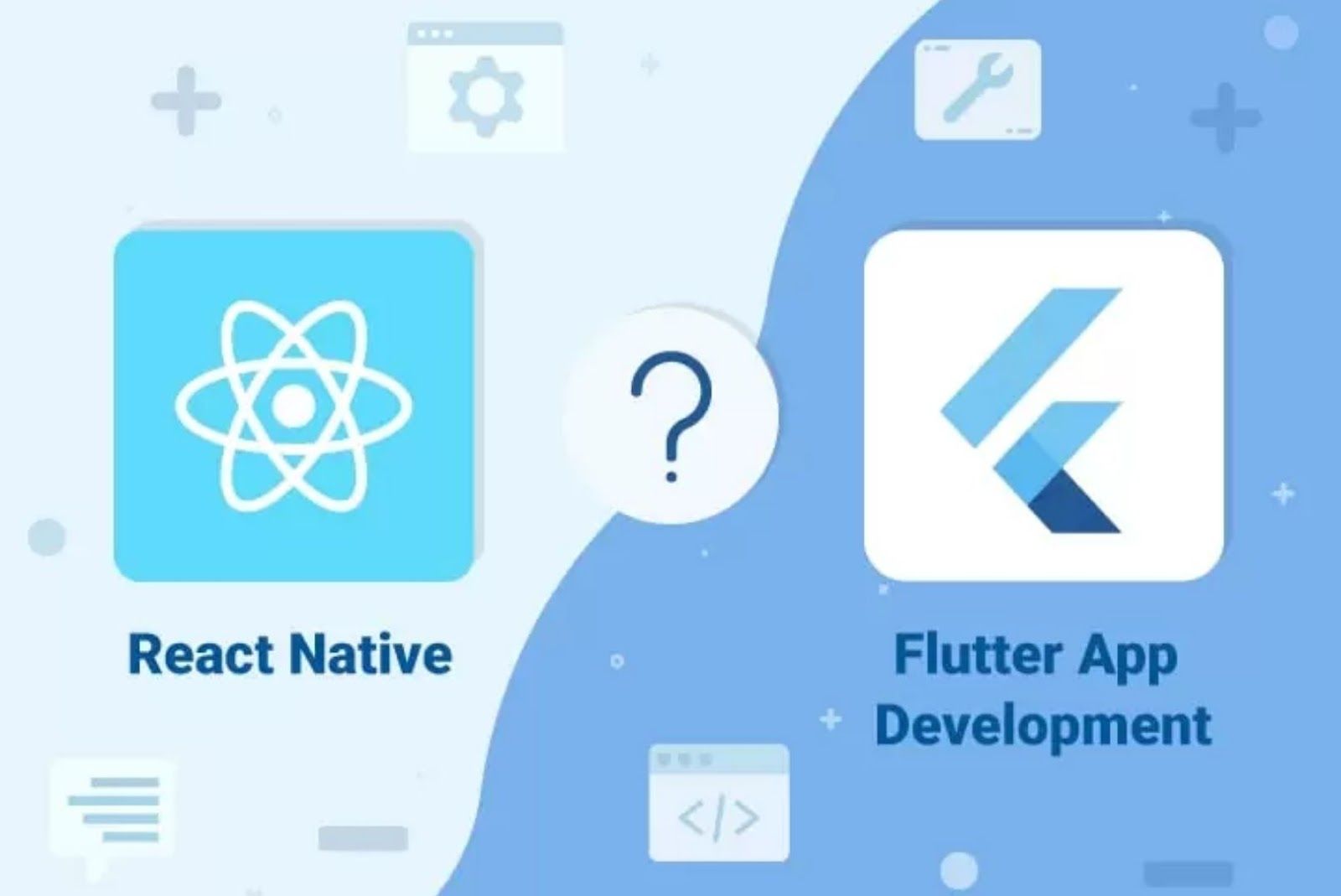
It’s 2022 and there is a great urgency for businesses to carve out space for themselves in the mobile phones of their users. Regardless of the industry, every business wants to create a quick mobile app in order to offer a comprehensive and customized solution to individual customers. Unfortunately though, creating native apps for Android and iOS are quite time-consuming, and hence, cost-intensive. So the concept of cross-platform mobile app development has gained momentum and Flutter vs React Native has become the community’s favorite buzzword.
Table of Contents
Cross-platform apps are faster to develop because they let you use the same code for multiple platforms. However, different frameworks offer different features and advantages for efficient cross-platform development. In this blog, we have tried to present a detailed comparison between the two most popular cross-platform frameworks - Flutter and React Native.
Furthermore, we’ll also take a stand between this tug of war between React Native vs Flutter and get to a conclusion about which is better, Flutter or React Native.
So, are you ready? Let’s dive in!
An Introduction to Flutter

What is Flutter?
Flutter is an open source framework by Google that builds, tests and deploys multi-platform applications including mobile, web and desktop all from a single codebase.
It is a comprehensive framework that comes with widgets and tools that are fast, attractive and customizable thereby ensuring your Flutter apps have a great look and feel.
What is Flutter used for?
Flutter enables cross-platform app development. When it comes Flutter’s desktop support you can build apps by combining Flutter’s source code to Windows, MacOs and Linux desktop app.
On the other hand, Flutter’s web support is useful in building Progressive Web Apps (PWAS), Single Page Applications (SPAs) and mobile apps.
How reliable is Flutter?
Flutter is an open-source framework that uses Dart which is a fast, object-oriented programming language. Dart and Flutter have been created by Google who’s using the framework for some of its biggest applications.
Naturally, they are constantly pushing the framework towards being the ultimate solution for creating cross-platform apps. Although Flutter is much younger than React Native it has really come to age. From its initial alpha release back in May 2017 to its first beta release in Feb 2018.
Fast-forwarding to Flutter 1.0 and its newest version is 2.2.0, one can confidently say that Flutter is a growing technology that is getting increasingly stronger and working actively to make improvements in performance and quality.
What are some of the Popular apps made With Flutter?

Read More: Why Flutter App Development Is the Future in 2022: Flutter 2.8 Amplifies its Dominance
An Introduction to React Native

What is React Native?
React Native is perhaps the renowned world champion of cross-platform mobile development.
A open-source javascript framework built upon the React library both of which are created by Facebook. Thanks to its UI building blocks, it lets you build truly native apps that doesn't compromise on the users' experiences.
What is React Native for?
Cross-platform app development
Developing mobile apps using JavaScript language
Building applications for IOS and Android platform with a single code base
How reliable is React Native?
React Native started out as an internal hackathon project at Facebook back in 2013, and in 2015 it was released to the public. React Native being more older than Flutter is definitely more mature in its functioning. Not to mention its backing by Facebook and their plans to introduce remarkable features such as the Lean Core, TurboModules and the React Native Fabric.
What are some of the Popular apps made With Flutter?

Read More: React Native Cross-Platform App Development: When & When Not to Use it?
Flutter: Pros & Cons

Pros of Flutter
Codesharing leading to faster development
Like any other cross-platform technology, Flutter allows you to use the same code base for building separate iOS and Android apps.
This, in turn, speeds up the whole development process which means that you don’t need two teams working on the code for a single platform.
Easy bug fixing with Hot Reload
Flutter’s “hot reload” makes it possible to make changes to the code and see the results immediately in the app preview, without the need to recompile the code.
This way, you can easily fix bugs and experiment with different UI elements and features once you’re at it.
The layered architecture enables high customization
Flutter has a layered architecture that paves the way for easy and quick UI customization. It’s said to give you control over every pixel on the screen and let you overlay & animate graphics, video, text, and controls without limits.
How can you ensure that all of these get successfully imbibed in your app? You should Hire Flutter developers who are plenty skillful and seasoned at building flawless apps.
Clear separation of UI from the native controls
Flutter separates UI from native controls, which eliminates a lot of nuances and errors made by smartphone manufacturers.
These might not happen too often but are difficult to omit with native development. Separate UI also means having a unified view on all system versions without an effort.
Cons of Flutter
Flutter is relatively new
There’s no doubt about the fact that both Flutter and Dart haven't been around for long, which is why they not be counted as entirely stable.
The lack of advanced features, a less experienced community and plenty of its libraries still being in the pre-alpha stage is what puts Flutter a little bit behind its counterparts.
No continuous integration support
Flutter lacks the support of CI platforms while writing code as so, to achieve automatic building, testing, and deployment.
Platforms like Jenkins or Travis support developers immensely without which they need to use custom scripts that takes them a lot of time.
Size of the framework
Applications written in Flutter are quite large and heavy in size. Flutter apps occupy a ton of space and take a fair amount of time to download or update it.
Hence Flutter based apps tend to be weighty. Apps built with Flutter are also not supported by browsers yet. This means no web apps.
Not a completely native experience
Flutter-based apps do not provide a complete look and feel as native solutions. This is because Flutter doesn’t create native components.
It replicates it to a certain extent but it’s not exactly the same. The difference is visible since it combines Android’s Material Design & iOS-specific components with its Cupertino library.
Read More: 7 Reasons Why Building A Startup App in Flutter is Ideal For Your Business
React Native: Pros & Cons

Pros of React Native
Rich components library reduces manual development time
The major selling point of React Native is the shorter development time. The framework provides numerous ready-to-apply components that can accelerate the process.
React Native is based on JavaScript, which gives access to the largest package ecosystem in the world. Having access to such an extensive base of packages, you can save much time, and it will only get better.
Fast Refresh is a step ahead of Hot Reloading
One of the top React Native pain points was that the Hot Reload feature was broken. Most developers had it turned off as it was unreliable. The response to these complaints is Fast Refresh.
This tool, released at the end of 2019, fixes all the issues that Hot Reloading has and provides a great developer experience that speeds up both building new features and bug fixing.
Declarative UI
React Native is solidly based on creating a mobile UI. In native development, you will need to create a sequence of actions in the application.
React Native apps employ declarative programming in which such an order of implementing actions is obsolete. As a result, it is much easier to spot bugs on the paths a user can take.
Strong community support
If a React Native developer experiences a problem, they can turn to the vast community for support. There will always be someone who’ll be able to help them resolve their issues.Building React Native apps opens the door to various advanced features that can immensely enhance the users experience.
For this, you should hire React Native developers who are the most adept and experienced those who can champion React Native to make an exceptional app for your business.
Cons of React Native
Compatibility & debugging issues
When using React Native developers might face various issues with package compatibility or debugging tools. While React Native has an a huge number of libraries, most often than not, they are in low quality or have been abandoned.
The process of debugging is equally hard for React Native apps as are built using Java, C/C++, JavaScript, etc. Hence developers must be well-versed in the Native language of the platform.
Slower testing process
While the speed of the React Native app development process may be quite impressive, the same cannot be said about the testing process and the extra effort from the Quality Assurance team.
The time spent on testing a React Native app is similar or sometimes even more than the time spent on testing in native development. Thus it can be said that testing is more challenging.
Hard to determine user interface
Despite its maturity, React Native still lacks several features that you may need to build your app. For example: Multiple screen transitions, animations and interactions.
If you’re looking to build something complex and intricate, developers may face difficulties building those with React Native and so may not be the perfect choice in such a situation.
Fewer Custom Modules
React Native supports only basic components and lacks others. Those that are also there might turn out to be underdeveloped.
Although there are many outside repos with additional components for React Native but for this a developer might need to spend additional time and effort.
Read More: Why Flutter Is the Best Platform to Make Hybrid Apps?
Flutter vs React Native: Technology Architecture
React Native apps require JavaScript Bridge as a runtime environment for it to function. This bridge serves as a medium for JS code to communicate with native modules. In simple words, React Native mandates the JS code to be compiled into native code at run time. You need to use JSON to enable this communication between the two sides.
Thus, if the app isn’t built with a smooth UI, there are high chances of increased load time for the UI elements. That’s because the rendering speed of each UI element is heavily influenced by the performance of the JS bridge.
React Native uses Facebook’s Flux architecture to build smooth, fast-performing mobile apps and because Flutter uses Dart, it gets the advantage of having access to the Dart’s in-built tools for UI. For example, it comes packed with design tools like Material Design (for Android) and Cupertino (for iOS) that are quite resourceful for building mobile apps. It uses the Skia engine to leverage the power of these built-in tools.
Thus, Flutter app architecture is pretty simple to work with. There is no need for any mediator (like JS bridge) because Dart and Skia compile the native code ahead of time. In short, the Flutter engine comes with pretty much everything required to build cross-platform mobile apps.
Comparing React Native vs Flutter On Important Considerations

Each framework has its own pros and cons but those alone are not sufficient to help us make the right choice. So here’s a side-by-side comparison of React Native vs Flutter on all the important considerations of mobile app development.
Flutter vs React Native: Performance
React Native has to rely on JavaScript Bridge to communicate with native components. So obviously, it takes more time to load the elements. On the other hand, Flutter compiles the code ahead of app run time. So the performance is much, much faster in Flutter apps.
That means, your Flutter app can yield an animation runtime speed of as high as 60 frames per second.
But, we are not saying that kind of speed is not possible to produce in React Native apps. You can certainly use third-party libraries that provide the same app speed. However, there are always more complications with the app the more libraries you integrate it with, especially when you build hybrid apps.
Undoubtedly then, Flutter is a clear winner when it comes to flutter vs native performance especially when it comes to building hybrid apps.
Flutter vs React Native: Testing Support
Again, because Flutter uses Dart, it offers comprehensive support for automation testing. Flutter developers and testers have access to tons of testing features for unit, integrated, and widget testing of the app.
The cherry on the cake is Flutter’s detailed documentation for making the most of its testing features. The documentation also helps you with automated app releases on both Play Store and App Store.
On the other hand, React Native has absolutely zero official testing support for UI level and integrated testing. The tools that it does offer are only for unit testing and that’s a very limited set too.
That means, React Native developers have to rely on third-party tools like Appium and Detox for UI level testing. Furthermore, there is no support for automated app deployment on Play Store or App Store either. You have to work your way through Xcode/Android Studio to manually deploy the app to their respective stores.
Flutter vs React Native: Code Maintainability
In React Native, upgrading and debugging the code can be a pain. When you fork the code to suit your application, it interferes with the framework’s logic thereby slowing down the development process.
In addition to that, most of the native components might have a third-party library dependency. Often these libraries are outdated and cannot be maintained properly due to the issues that come along with it by default.
In contrast, maintaining a Flutter application is much easier. The simplicity of code helps developers spot issues, source external tools, and support third-party libraries.
Moreover, the time taken for releasing quality updates and making immediate changes in the application are considered to be better in Flutter than the hot reloading capacity of React Native.
Flutter vs React Native: Developer Productivity
React Native vs Flutter which is easier to learn? If the React Native developer is skilled in JavaScript, then it’s fairly easy to use those skills for cross-platform app development. React Native has a hot reload feature which saves a lot of developer time while testing the changes in the UI.
In terms of IDE support, developers are free to use any text editor or IDE of their choice. Flutter also has a hot reload feature and it’s very easy to get started with the demo app.
However, as the complexity of apps grows, developers would need to learn and adopt the new Flutter concepts. In addition, Dart is not a common programming language and there is a lack of support for it in many IDEs and text editors.
Read More: Top 10 Flutter and React Native UI Libraries
Conclusion: When to choose React Native and when to use Flutter?
Before we dive into when to choose what, take a look at some of the popular apps built with Flutter vs React Native. That alone will give you an idea as to which one is suitable for which kind of app.
React Native is a good framework to build simple native and cross-platform applications, and Flutter does a great job at creating multiple iterations and MVP applications. Hiring developers for startups or businesses is a sure-shot way to kick off your app & see it succeed.
Choose React Native, if:
You want to scale your existing applications with cross-platform modules.
Your requirement is to develop lightweight native applications.
You are looking for possibilities to create shared APIs out of the box.
Your goal is to create an app with an asynchronous build and a highly responsive UI.
You have sufficient time and money to invest in the project.
Choose Flutter, if:
Your idea does not require complete native functionality.
The budget and delivery timeline are tight.
You want to write codes faster and deploy them into the market quickly.
Your requirement is to customize the UI with widgets and less testing.
Build Your Cross-Platform App The Right Way
We specialize in minimizing development costs and prioritizing features that increase customer acquisition.
Get A Free Cost Estimation For Your Project
Conclusion
Flutter and React Native has been making waves in the developing world for the last couple of years. They are exceptional mobile development platforms aimed at helping you build mobile applications.
They both emphasize the use of their own programming languages and are designed to work with a specific set of tools. The two are comparable in terms of performance and so it is best to consider each on its own merits while keeping in mind what would be the most suitable for you.
Looking for some sound advice to discuss your project? We’d rather suggest you to turn to an expert app development company over the advice of a developer who may be skilled at one framework but would not be able to help you make an ideal decision.
We sincerely hope this article will help you make a decision.Thank you for reading, we are always excited when one of our posts is able to provide useful information on a topic like this!
MORE ON FLUTTER & REACT NATIVE
